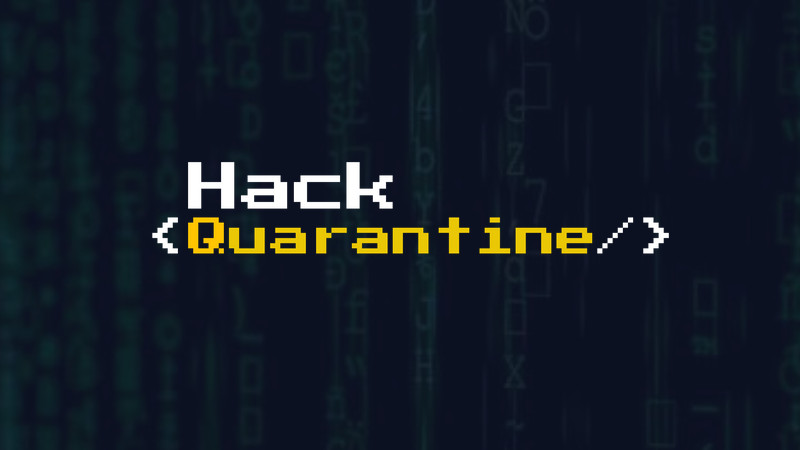As the COVID-19 pandemic invades in some way every corner of life, we’ve seen significant effort from the hardware community in considering the problem of inadequate supplies of medical equipment. The pandemic and its associated quarantine and lockdowns do not stop at medical supplies though, a whole host of problems associated with the whole population self-isolating are there to be solved. This makes Hack Quarantine, an online event that bills itself as “A global virtual hackathon”, particularly interesting. It’s encouraging its participants to look at the wider aspects of the whole thing rather than solely dreaming up an open-source ventilator design, because in the absence of clinical trials or indeed any experts in medical devices it’s possible that medical equipment from a hackathon might be of limited usability.
The hackathon will run from March 23rd to April 12th, and it already has a schedule of talks and workshops. We can’t help noticing a dearth of hardware-related stuff among all the software, and perhaps this could be where you come in. It’s something that never ceases to amaze us as Hackaday writers, the depth of hardware skill among our readership, and we’re guessing that plenty of you could bring something to this event.
We’ve brought you more than a few COVID-19 stories over the last few weeks. If this hackathon isn’t for you then can we point you at our Folding@Home team? Also, you may wish to look at the best fabric choice for your own face masks.

















While I clearly welcome any effort to keep people busy and enthusiastically occupied, the hackathons I have witnessed so far (e.g. the “official” one here in Germany) have been quite disturbing. Hundreds of identical projects, mostly created by people who obviously only have their own interests in mind, thousands of self-acclaimed “project managers” and “mentors” with doubtable abilities (judging from the lack of eloquence of their self-announcements or the strange “languages” they use) and, foremost, artists who dream about finally getting paid by some government driven fund instead of creating their “art” exclusively for themselves, like they – obviously – did in the past.
What I would LIKE to see are projects that openly target cooperation and exchange of ideas, solutions and ressources. COOPERATION, in my world, should be the new “hype”. With miriads of new websites and facebook groups popping up that all claim to do the same and none doing anything at all, what we need is easy-to-access real information, moderated and curated by real people, helpful and up to date “everyday” bits of what-you-need-to-know.
Again: Hackathons – the kind I have seen so far – are cool to keep geeks and “hackers” happy. I would merely prefer all those talents (the roughly about 1% of the people signing up for those online-communities who can actually “do” something) to be put together, as in TOGETHER, and start working on a better world that works for everyone of us.
what, in your opinion, should those projects be? What would they make?
Again, my concern is the lack of cooperation. Everyone wants to be “in charge”, everyone wants to be the “public face” of a project – which leads to literally hundreds of 1:1:1 identical projects all with 1-3 people doing exactly the same thing. THAT I find highly frustrating and it has kept me from participating in any of those projects (even though I have some time at hands right now).
In my world, supporting the local economy is one important thing to do these days. If you accept a simplified example: Why is there no (e.g. google maps driven) local restaurant info service where you can see, at a glance, what restaurant/bistro offers take-away? Why would you have to call each and every restaurant individually? We don’t need 24 “restaurant maps” in one 10k-citizens area, I would welcome “local authorities” (whoever) to coordinate projects like this (again, just a simplified example) and provide ONE go-to-map.
Why do we need 31 different “neighbor-assistance” apps in an area of roughly about 40 square km that all overlap to some degree? Which one would I call if I was in need? All of them?
I am an old white man. If I hadn’t grown up with electronic communication, I’d hesitate to use the web or, beware, smartphone apps these days for the unmanageable number of copy&paste services. Less is more. Besides, here in Germany there are considerably more people offering their assistance than people asking for help, which – again – leads to services starting to compete with one another over the very, very small number of people in need.
My preference would be – and actually is – on reducing the number of identical services (without abbandoning their services, if that makes sense), prepare infrastructure (not PR for individuals), shift expectations (no PR pun intended), educate people about what changes in behavior are required NOW and what might make sense for the times AFTER the crisis. Fundamental changes/improvements that do NOT require single artists to get their spotlight moment and finally get paid for their work, but lay out resources for a better society AFTERWARDS. And benefit from that right now.
There are a lot of – locally focused – NEEDs that can be tackled now. Changes in behavior can be introduced based on “social distancing requirements” NOW that can be benefitial to everyone after the crisis ended (coordinating shopping tours: Not every single human being needs to drive in their own car to the shopping mall to buy a single roll of toilet paper – not today, not ever!).
Apologies for the text wall, this is definitely something to discuss in a real chat, not on this website.
Hey there,
We totally understand your concerns. Our entire team have both organised hackathons and attended plenty as hackers. We’ve all seen the same projects recycled time and time again, with these projects often not being as beneficial as hackers claim.
We’ve tweaked a few things in the standard hackathon formula to try and avoid this as much as possible:
* We’ve intentionally not announced track/overall prizes. We want people to be creating things that they feel are legitimately useful, rather than shoehorning in ideas that they think will win prizes. While I’m sure we’ll see some teams continue to try to do this, we are keeping an eye out for it in judging.
* We’ve downplayed the competition element as much as we could, and I don’t think anyone has really discussed a want to win in our Discord server since we launched.
* We’ve allowed teams who don’t care about winning prizes (which appears to be a pretty good proportion of teams) to work in an uncapped team size. We really hope this creates groups capable of creating significant contributions to fighting the issues caused by COVID-19.
* Hack Quarantine runs for three weeks, to allow tangible products to be created, rather than rushed prototypes.
* Anyone is able to opt-in to help mentor a language, technology or concept. There is no glory for mentors, no special name colour, and no special recognition. We want people who are there to help others learn and build, rather than those who are interested in recognition.
We are all for collaboration between teams and hope that the tweaks we’ve made encourage this. We’ve seen some teams who have entered Hack Quarantine with the aim of utilising our resources to create a social enterprise to help others, and this is something we hugely support.
I understand why you feel that hackathon projects have limited impact: they very often do. But, there are exceptions to this, and we are working hard to provide a space and resources which encourages exceptions.
Hokay, maybe we need to run a Jobs-a-thon then, where ppl take something someone else did 2 years ago, hype the crap out of it and charge 3 times as much.
Most “Hackathlons” at my Univ turn out to be coding competitions where the participants have to solve a puzzle like problem as fast as they can,(CodeChef like) instead of creating anything useful, new or exciting.
I get suspicious when I hear the word “Hackathlon”, because its most likely an offline Leetcode-esque competition, which is overwhelmingly boring.
Thank you for confirming my non-academic impression.
I’ve only participated in two events that were called ‘Hackathon’, both of them were at my workplace. Only one of them was what I would actually consider to be a hackathon where people work on projects they want to work on. The other was just the development team swarming on work that was required for the business, it was a handy way to brand a fairly long day of work.
Hope good stuff comes out of that.
Meanwhile a cooperative effort is running in Spain and other countries to fight against coronavirus.
It might be of interest to write a hackaday article about https://coronavirusmakers.org/ and the many projects that are been developed. (there are around 15000 people in the main telegram group @CV19Makers_Anuncios )
Maybe app where you write what you have and it returns list of recipies for dish you can prepare? ;)